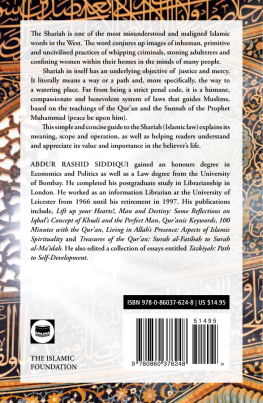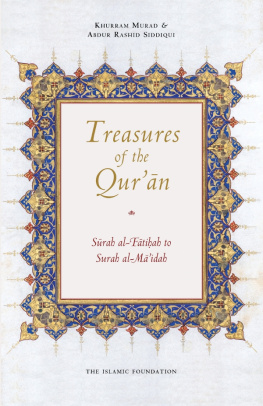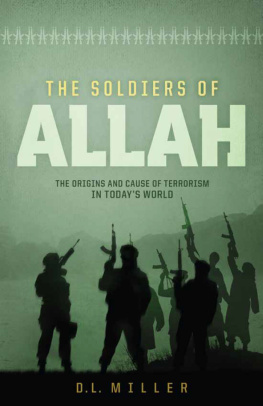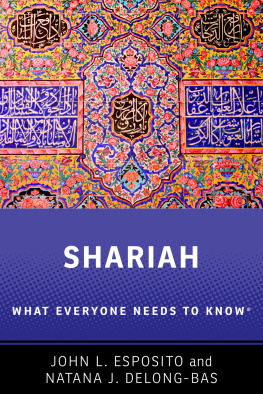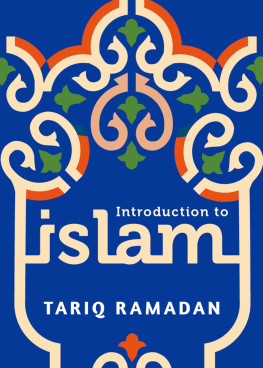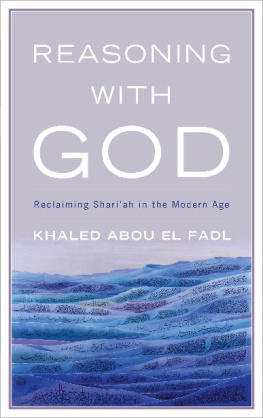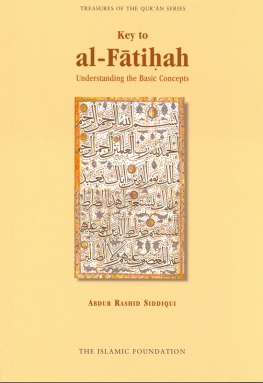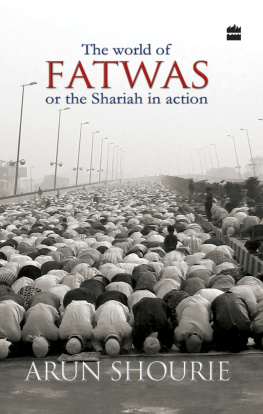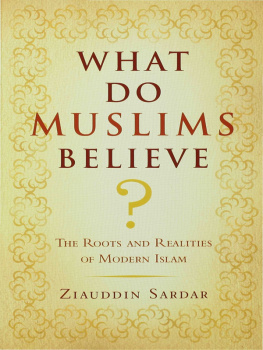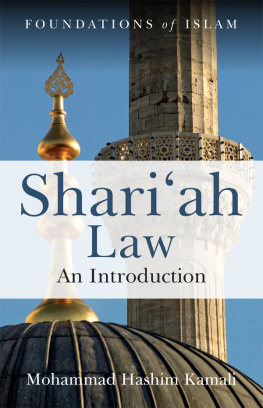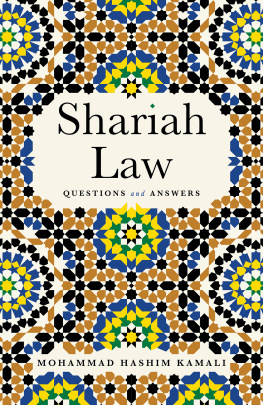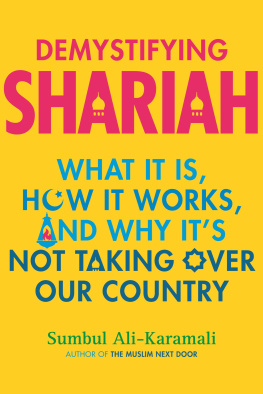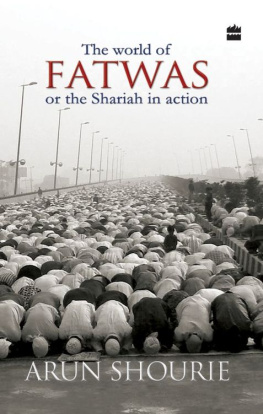

Shariah: a Divine Code of Life
Published by
THE ISLAMIC FOUNDATION,
Markfield Conference Centre, Ratby Lane,
Markfield, Leicestershire LE67 9SY, United Kingdom
E-mail:
Website: www.islamic-foundation.com
Quran House, PO Box 30611, Nairobi, Kenya
PMB 3193, Kano, Nigeria
Distributed by : Kube Publishing Ltd.
Tel: +44(01530) 249230, Fax: +44(01530) 249656
E-mail:
Copyright The Islamic Foundation 2018/1439 H.
All rights reserved. No part of this publication may be reproduced, stored in a retrieval system, or transmitted in any form or by any means, electronic, mechanical, photocopying, recording or otherwise, without the prior permission of the copyright owner.
British Library Cataloguing-in-Publication Data
A catalogue record for this book is available from the British Library
ISBN: 978-0-86037-624-8 PB
ISBM: 978-0-86037-629-3 e-Book
Typeset by: N.A. Qaddoura
Cover design by: Nasir Cadir

CONTENTS
Arabic Consonants
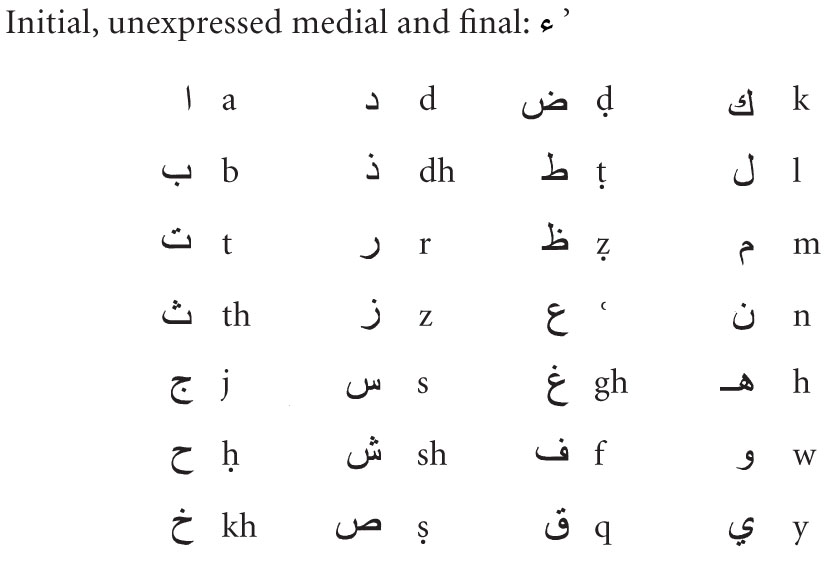
With a shaddah , both medial and final consonants are doubled.
Vowels, diphthongs, etc.
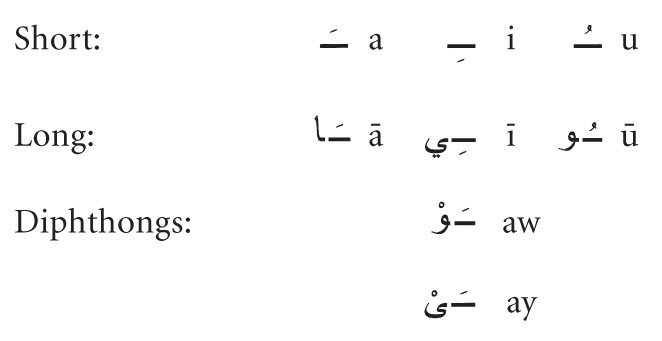
T his brief presentation is written at the request of my very dear friend Shehzad Ahmed. He kept persuading me, for many years, to write something simple and concise on the Shariah to explain its meaning, scope and operation in practical life, which would also help in understanding and appreciating its value and necessity in the believers life. Such an endeavour is also necessary to dispel the negative and damaging coverage of the Shariah in the Western media. Its adverse portrayal spurs abhorrence in non-Muslims and causes embarrassment to some Muslims who lack proper knowledge.
In Chapter I, I try to address the meaning, components and sources of the Shariah. I also briefly discuss the main objectives of the Shariah as well as the Islamic legal maxims to elucidate the Shariahs humane, compassionate and benevolent attitude when dealing with human affairs. In the following Chapter, the Shariahs guidance for establishing a just and caring society is discussed again, highlighting its enlightened and civilising nature. Issues such as the harsh penal punishments, the treatment of women, homosexuality and apostasy and such like topics, that often raise concerns about the Shariah, are dealt with in Chapter III. In the next chapter the process of the Shariahs implementation in personal life, society and the state are fully discussed. The chapter demonstrates that the whole process of the Shariahs implementation has to be introduced gradually and willingly, and not by force, even in Muslim countries. This also shows that the call to introduce the Shariah instantly is inappropriate and inconsistent with the Islamic approach. In the concluding chapter, I summarise the Shariahs characteristics and its universal and holistic approach. The Bibliography will help those who want to pursue further reading on this topic. For those who just want to know what is lawful and what is prohibited in Islam, I recommend Sheikh Yusuf al-Qaradawis The Lawful and the Prohibited in Islam . This book comprehensively covers most subjects such as food and drink, work and earning a living, clothing and adornment, marriage and family life as well as recreation and play.
This book could not have been completed without the help and guidance of my very dear brother, Prof. Khurshid Ahmad, who, despite his heavy commitments, thoroughly read the manuscript and suggested many changes and improvements. He also arranged for me the procurement of several books on Maq as id al-Shariah from Pakistan. Again, at his suggestion, I have included a few more topics as well as a section on the explanation of the fundamentals of the Shariah as an Appendix. This is reproduced from a book by Sardar Sher Alam Khan entitled The Role of the Judiciary and the Objective Resolution published by the Institute of Policy Studies, Islamabad. I thankfully acknowledge the generosity of the Institute for permission to reprint it. I am most grateful to Prof. Khurshid Ahmed for all his support.
I am also indebted to Prof. Salman Nadvi for reading the manuscript and providing very useful comments and suggestions. I am equally thankful to Prof. Abdur Raheem Kidwai for going through the manuscript and suggesting the inclusion of a few more topics under the section of Issues of Concern Regarding the Shariah. The comments of Shehzad Ahmed and Hasan Ahmed were equally useful, which encouraged me to continue the work. Last but not least, I am profusely indebted to Dr. Anis Ahmad for his critical assessment of the manuscript and suggestions.
I would be failing in my duty if I didnt acknowledge the help of the Islamic Foundation Library. I am grateful for the help of Br. Muhammad Sadiq for tracing books and references and Br. Abdul Hayee, the Librarian.
I praise Allah, the Most Gracious and the Most Merciful, Who gave me the tawf i q to produce this work. I pray that this short introduction will help readers to understand and appreciate Allahs Mercy in bestowing upon us His blessing by providing guidance through His Shariah.
Abdur Rashid Siddiqui
21st August 2017
18 Dhu al-Qi[dah 1438
T he Shariah is one of the most misunderstood, even maligned, Islamic terms. The word conjures up images of the inhuman, primitive and uncivilised practices of whipping criminals, stoning adulterers, chopping off the hands of thieves and confining women within their homes or only allowing them to venture out enshrouded in a burqa , usually black and covering them from head to toe. No wonder that non-Muslims fail to understand why Muslims yearn for the introduction of the Shariah. To some extent, Muslims are to blame for the creation of this confusion. Whenever they call for the establishment of an Islamic state, their first priority is the introduction of the Islamic penal laws. However, one should not forget that the thirteen years that the Prophet spent in Makkah were dedicated to building an Islamic society and imbibing it with Islams fundamental tenets of faith. Moreover, during that early period, Allah had not yet sent down all the laws and regulations. But even in Madinah, the laws were prescribed gradually while the penal laws were revealed much later. Thus, the introduction and enforcement of the penal laws right at the beginning is contrary to the religions strategy for social change and the spirit of the Prophets way. In such a context, there is a need to explain to both Muslims and non-Muslims what the Shariah is exactly and the process of its implementation.
Shariah literally means a way or a path and, more specifically, the way to a watering place. In Islamic terminology, after accepting Allahs d i n (Religion), the way to be followed, as shown by His guidance and that of His Messenger, is the Shariah . This is the path and source of guidance for humankind and its success in this world and salvation in the Hereafter. This guidance, which is revealed by Allah through His Messenger, covers all aspects of life: beliefs, acts of worship, social transactions and morals. To each among you have We prescribed a Way (Shariah) and a Way of Life (al-M a idah 5: 48); Then, We put you on the (right) Way ( Shariah ): so follow you that (Way) and follow not the desires of those who know not (al-J a thiyah 45: 18); He has prescribed for you the Religion which He has enjoined upon Noah and which was revealed to you (O Muhammad), and which We enjoined upon Abraham and Moses and Jesus, commanding: Establish this d i n and do not split up regarding it (al-Sh u r a 42: 13).
Next page
